Jaco Mouton: The Journey to Ironman
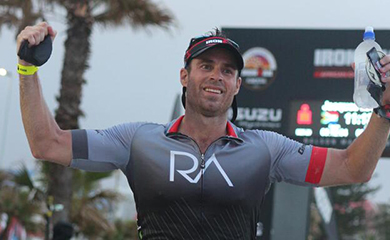
How many triathlons have you participated in so far?
The first triathlon I took part in was the annual Slanghoek Triathlon – sprint distance in South Africa in 2010, comprising a 650m swim, 20km mountain bike ride and 5km trail run. Since then, I have participated in numerous triathlons, 3 of which are Ironman races.
I would have loved to do more, but keeping up the training while working offshore proved to be very difficult. Since I started working in the office with Axess Africa, I have more time to pursue this passion.
What do you find most appealing about triathlons?
They encompass a whole lifestyle, requiring the athlete to have the dedication to maintain good health – both physically and mentally.
Triathlons are the perfect combination for me. I have a liking for running, and I am comfortable with open water swimming due to my experience with lifesaving as well as crayfish and abalone diving. In addition, I have always wanted to try cycling as a sport. I get to train for three disciplines for one race, so it does not feel repetitive.
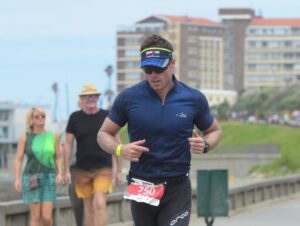
Why did you participate in Ironman races?
I learned about the different Ironman races after participating in triathlons and I like how technical they are. The full Ironman race is rated as one of the world’s toughest endurance events and I enjoyed the thought of testing my mental and physical capabilities.
As such, I participated in the Ironman 70.3 races to prepare for the full Ironman race. The former comprises a 1.9km swim, 90.1km cycle and 21.1km run, while the latter comprises a 3.8km swim, 180.2km cycle and 42.2km run.
What is your goal for such races?
I have only taken part in two Ironman 70.3 races and one full Ironman race to date, over the course of the past two years.
My ultimate goal is to complete the races, no matter the time taken. I do set target times, and I view them as additional challenges. In the three races that I participated in, I managed to accomplish my goals of finishing around the 6h mark for the Ironman 70.3 races, and about 12-13h for the full Ironman race. With these experiences, I now know that I could aim to complete the Ironman 70.3 race in 5.5h or less and the full Ironman race in 12h or less, with decent training.
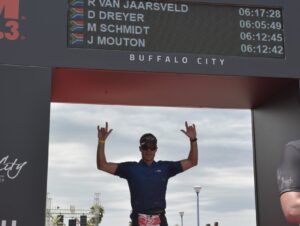
How difficult is it to complete the race?
It is crucial to have a well-designed training plan and discipline during training. If training was executed properly, the race itself is mind over matter. Mental strength on the day is very important because most of the disciplines require the athletes to cover the distances in two or more laps of the same route. Even with this awareness beforehand, there is nothing that will quite prepare athletes for the actual day.
For me, the four-loop 42.2km run in the full Ironman race was the toughest mentally. I found cycling the most physically challenging as I do not have a lot of cycling experience and still have to work on my endurance.
There are also a lot of unforeseen circumstances that must be dealt with on the day itself, such as rough sea conditions and strong wind, and these can affect the probability of success.
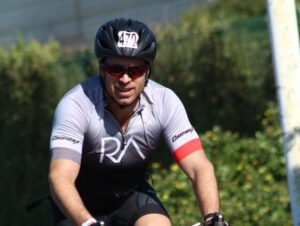
How did you train for the full Ironman?
I did the Ironman 70.3 Durban in July this year so I had a reasonably good base to start my training for the full Ironman. I started my dedicated training programme 18 weeks before the event, and I spent around 10 to 13 hours training weekly. I did most of the longer training rides before and after work, and ran over the weekends. On top of that, I did Pilates weekly to strengthen my core, and some strength training. I also went surfing whenever there is time.
During the peak training week, I swam 10 kilometers, cycled for 240 kilometers, and ran roughly 45 kilometers in total.
Aside from training, I also try to manage my diet. Ideally, athletes should not enter an endurance event carrying extra weight, but it is also very important to keep the energy levels up and the body’s reserves as well stocked as possible.
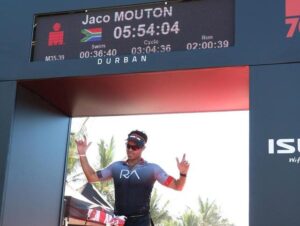
What qualities do you have that enable you to complete triathlons successfully?
I have above average athletic capabilities, which does help a lot, but I would say that my strongest attribute is my mental resilience to overcome tough situations. I also enjoy training and the discipline that comes with it – working hard to reach the set goals.
What do you learn from each triathlon?
That the human body is an exceptional instrument. As soon as you think you have reached the pinnacle of your capabilities, your body shows you differently.
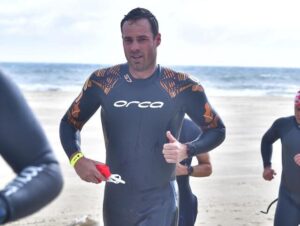
Do you plan to participate in future races?
I do plan to enter future races but I have not decided on any specific ones. I would like to enter the SkyRun 100, which is a 100km ultra-trail run. Besides that, I would also like to enter another Ironman 70.3 race next year and really challenge myself to achieve a good race time and hopefully get an invitation to take part in the World Championship.
Is there any athlete you look up to?
Kyle Buckingham of South Africa. He is nowhere near the best in the world, but he started competing professionally at a very late stage in his life and with hard work, he managed to make his passion his profession.
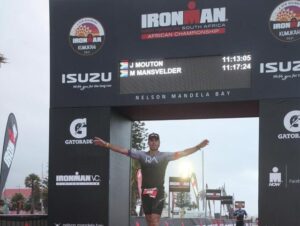
Do you have any advice to someone who is interested to start on this journey?
People from all walks of life participate in triathlons. Do not overthink it and just enter a short distance event. Even if you doggy paddle, struggle through the cycle, and walk half of the run course, it will be worth it. There is so much fun to be had with triathlons.